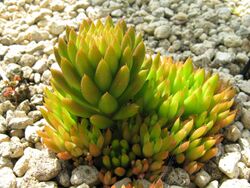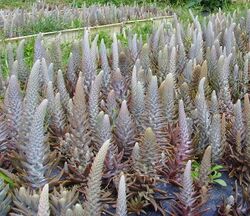Biology:Orostachys japonica
| Orostachys japonica | |
|---|---|

| |
| Scientific classification | |
| Kingdom: | Plantae |
| Clade: | Tracheophytes |
| Clade: | Angiosperms |
| Clade: | Eudicots |
| Order: | Saxifragales |
| Family: | Crassulaceae |
| Genus: | Orostachys |
| Species: | O. japonica
|
| Binomial name | |
| Orostachys japonica (Maxim.) A.Berger
| |
| Synonyms[1] | |
|
Cotyledon japonica Maxim. | |
Orostachys japonica (Japanese:爪蓮華、昭和、秀女)also known as rock pine is a species of flowering plant in the family Crassulaceae.[1] Native to East Asia. Its main habitat is on the surface of mountain rocks in Korea, Japan and China.[2][3]
Ecology
Orostachys japonica is a biennial/perennial plant growing to 10 centimetres (3.9 in). It is in flower from September to October. The flowers are hermaphrodite. The rosette leaves shape like a spatula.[3]
- Suitable for: light sandy and loamy soils, prefers well-drained soil and can grow in nutritionally poor soil.
- Suitable pH: acid, neutral and basic alkaline soils.
Because of its growing shape which resembles a pine tree's cone, and its habit of growing on mountain rocks, it is also called rock pine.[2] It grows well in a sunny or semi-shaded(light woodland) location with a well-drained and moist soil that is low in nutrients. Its flowers bloom from September to October. The flowers are white and each flower has 5 conical petals. The flower lacks a peduncle. Its calyx is divided into 5 parts. When the flowers bloom and produce seeds, it dries out.
Medicinal uses
The leaves and stems contain several medically active constituents including fatty acid esters, Friedelin and flavonoids.[2] They are antispasmodic and cytotoxic. It has anti-cancer effects in vitro. In Korea, they are used in the treatment of cancer, gingivitis, coagulation and metritis.[2]
References
- ↑ 1.0 1.1 "Orostachys japonica (Maxim.) A.Berger". The Trustees of the Royal Botanic Gardens, Kew. n.d.. https://powo.science.kew.org/taxon/urn:lsid:ipni.org:names:274621-1.
- ↑ 2.0 2.1 2.2 2.3 Medicinal Plants In the Republic of Korea. Natural Products research institute (Seoul National University). pp. 187.
- ↑ 3.0 3.1 "Flora of China on-line". FOC Vol.8 241000249. Flora of China on-line. Archived from the original on 15 October 2013. https://web.archive.org/web/20131015061112/http://www.floraofchina.org/. Retrieved 8 October 2013.
Wikidata ☰ Q15484095 entry
 |


